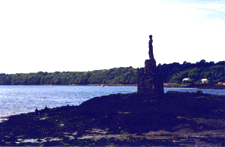 |
 |
 |
|
|||
|
Speaking the Language
"Wee, sleekit, cow'rin, tim'rous beastie, So you don't think you need to pack a phrasebook when you visit the United Kingdom. Well, if you plan to venture far from England and into the Celtic nations of Ireland, Wales and Scotland, think again. Not that everybody in Scotland talks like Robert Burns. Some people in the south of the country speak like Suzi.
Suzi: "In the Scottish borders, if you meet somebody and you know them, you might say, 'Hi, how'r ye dae'in.' And if they're doing OK they'll say, 'Aye, canna complain." And that's just dialect. Many of the words are English, or closely related to English. So, the chances are, after a while, you'll be able to communicate without too much trouble. Until your travels take you farther afield, that is, to the more remote corners where you could bump into people speaking an entirely different language. Like Clare in Northern Ireland, for instance, who might greet you in Gaelic.
Clare: "Conas tá', that means how are you. 'Táim go maith'. That means I'm very well." Or if you make it to Wales, famous for male voice choirs and friendly locals like Julie.
Julie: "Dia duit ar maidin'. How are you today. 'Tá mé go breá. Go raibh maith agat. Conas tá?' I'm fine thanks, how about you?" So, you've collected a small travel library: How to Speak Welsh, Scots Gaelic in Three Months, and Irish Gaelic Made Easy. All you need now to insure a trouble-free trip is a road atlas. Except that you may have trouble reading it as you try to get from A to B, especially if B is a village in Wales with the longest place name in the world: "Llanfairpwyllgwyngillgogerychwrndrobwillantisiligogogoch."
In other words, if you do stray into the Celtic parts of the United Kingdom, expect to get lost. And whether you can understand the locals or not, you'll get one message loud and clear.
Clare: "A saying, an Irish saying is, 'Go n-éirí an bóthar leat!' which means 'may the road rise with you', it means 'good luck and may the wind always be with you in your travels'." In Glasgow, I'm Adam Fowler for the Savvy Traveler.
|
 | American Public Media Home | Search | How to Listen ©2004 American Public Media | Terms of Use | Privacy Policy |


